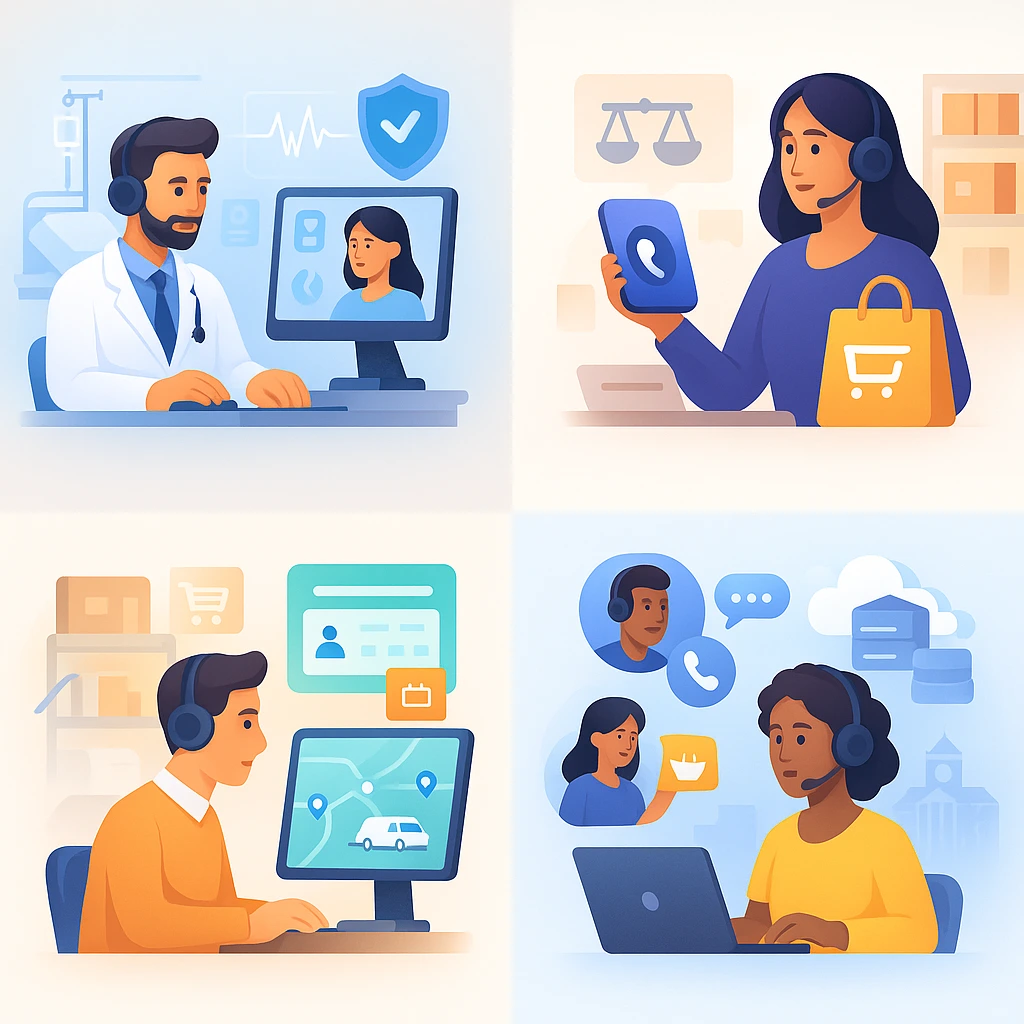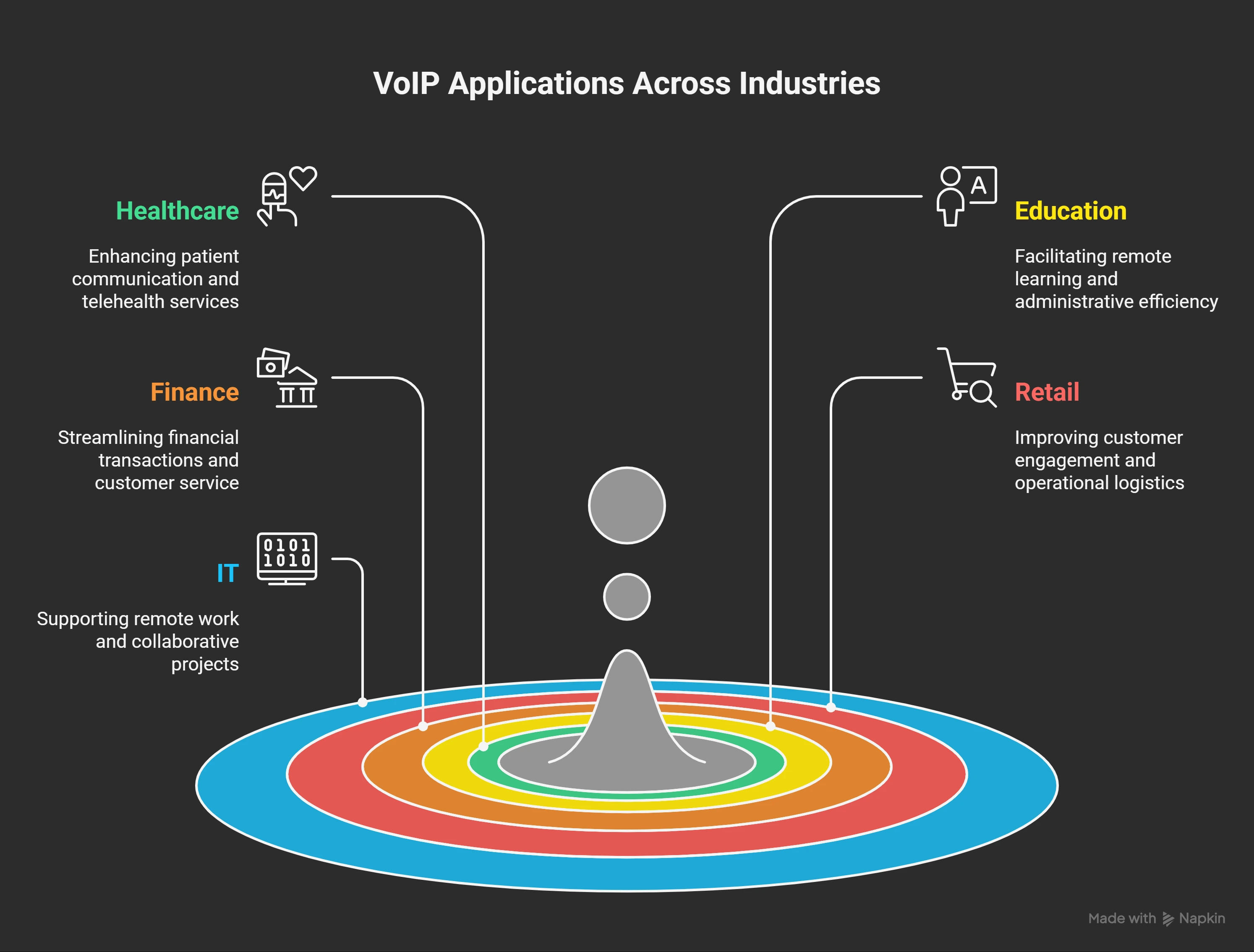
5 Top Examples of VoIP Usage Across Different Industries
Summary:
Voice over Internet Protocol (VoIP) is changing how businesses communicate by replacing traditional phone systems with internet-based calling. From healthcare and education to finance, retail, and IT, VoIP provides reliable, scalable, and cost-effective communication that supports both customer interactions and internal collaboration.
In this blog, we explored five top examples of VoIP usage across different industries, highlighting how it improves patient care, enables online learning, secures financial communication, powers e-commerce customer support, and enhances remote team collaboration. Whether you run a small business or a global enterprise, VoIP offers the flexibility and efficiency needed to stay competitive.

How companies communicate has changed with VoIP (Voice over Internet Protocol). Rather than depending on conventional landlines, firms increasingly employ internet-based telephone systems that are flexible, cost-effective, and scalable. VoIP is no longer a fad, it's a staple of contemporary business telephony.
In this guide, we’ll explore 5 top examples of VoIP usage across different industries, showing how it’s reshaping healthcare, education, finance, retail, and IT. You’ll learn how VoIP helps businesses cut costs, improve efficiency, and stay connected in today’s digital-first world.
What is VoIP?

VoIP stands for Voice over Internet Protocol, and it refers to calling over the internet rather than the usual phone lines. In a cloud phone system, voice data is translated into digital signals, sent over the web, and reassembled when received.
Simply put, business VoIP technology makes calls, video conferences, and messaging all on one platform. It's not calling anymore, it's unified communications that connect teams and customers closer.
Why Businesses are Adopting VoIP Over Traditional Phones
Legacy phone systems are costly and restrictive. Businesses require newer solutions that support remote work communication tools, elastic scalability, and integration with CRMs or customer service systems. VoIP delivers everything above and beyond.
Top reasons why businesses are moving towards VoIP are:
- Reduced cost of calls, particularly international calls.
- Scalability to easily add or remove lines.
- Mobility that allows employees to call from anywhere.
- Low-cost communication in comparison to legacy systems.
Key VoIP Benefits for Contemporary Organizations
VoIP's advantages extend beyond cost reduction. Organizations employ it to:
- Enhance cooperation with unified communications.
- Ensure business continuity with cloud calling.
- Offer secure industry-wide communication.
- Offer improved customer experiences.
Now, let's explore five industry-specific VoIP applications.
Top 5 Industries Leverage VoIP
1. VoIP in Healthcare
Healthcare organizations are moving towards VoIP to manage patient communication, telemedicine, and secure collaboration among employees. Clinics, hospitals, and distant care providers depend upon internet-based call systems for effectiveness and HIPAA compliance.
Pros:
Enhanced Patient Communication: Reminders, follow-up, and call scheduling become easy and efficient.
Telemedicine Capable: Enables video consultation, remote diagnosis, and care of patients from rural locations.
Secure and Compliant: HIPAA-compliant systems maintain patient data confidentiality.
Cost-Effective Communication: Minimizes costly landline charges while enhancing reach.
Cons:
Internet Dependence: Unreliable connectivity will cause call disruptions.
Setup Costs: Upfront integration with hospital information systems could involve investment.
Staff Training: Some personnel will require training to utilize VoIP software optimally.
Best For:
Hospitals, clinics, telemedicine startups, and any health organization requiring secure, dependable, and flexible communication solutions.
2. VoIP in Education
Schools, colleges, and educational websites utilize VoIP technology for business to link teachers, students, and parents. Internet-based calling is highly advantageous for online classes, virtual collaboration, and administration.
Pros:
Virtual Classrooms: Provides live lectures, group discussions, and screen sharing.
Cost Savings: Lowers phone bills for schools.
Improved Collaboration: Teachers, students, and parents are able to communicate hassle-free.
Scalable Solutions: Adapt easily according to the number of students or employees.
Cons:
Technical Glitches: Interruptions in the internet may hamper lessons.
Limited Personal Touch: Online-only communication might limit face-to-face interaction advantages.
Initial Learning Curve: Educators and students might take time to get accustomed to VoIP tools.
Best For:
Universities, K-12 institutions, tutoring sites, and online education companies seeking remote learning communication software and scalable solutions.
3. VoIP in Finance
Financial organizations, such as banks, insurance companies, and investment firms, employ VoIP across various industries to handle secure client communication, global collaboration, and regulation compliance.
Pros
Secure Client Communication: High-quality calls minimize the risk of miscommunication.
Safe Transactions: End-to-end encryption keeps sensitive financial information safe.
Global Connectivity: Cost-effective communication among offices worldwide.
Integration: Integrates with CRM and customer support applications for tracking interactions.
Cons:
Network Security Dependency: Strong IT security protocols are necessary.
Subject to Downtime: Outages can interfere with essential client communication.
Compliance Issues: Selecting a fully compliant VoIP provider is essential.
Best For:
Banks, investment houses, insurance providers, and financial service institutions require secure, international-ready communication.
4. VoIP in Retail and E-commerce
Online stores and retailers implement VoIP examples to manage customer support, order tracking, and holiday surges in demand. Cloud phone systems make operations more efficient and enhance customer satisfaction.
Pros:
- Improved Customer Support: Routing of calls and automated systems enable quicker service.
- Order and Tracking Support: They are informed promptly about their orders.
- Scalable: Handles high volumes of calls during holiday seasons with ease.
- Cost-Efficient Communication: Has less overhead when compared with call centers.
Cons:
- Internet Reliability: Slow internet connections can impact customer experience.
- Technical Maintenance: Needs periodic updates and troubleshooting.
- Training Needed: Employees need to be trained to use VoIP systems effectively.
Best For:
E-commerce websites, retail chains, and customer service centers in need of scalable and reliable communication solutions.
5. VoIP in IT and Remote Work
IT corporations, software companies, and distant teams depend seriously on the latest business telephony for internal communication, collaboration, and project coordination. VoIP offers global teams unified communications applications.
Pros:
Unified Communications: Integrates calls, video, and messaging into a single application.
Remote Collaboration: Employees can collaborate from any remote location, yet stay productive.
Integration with Tools: Integrates with CRMs, project management, and team collaboration applications.
Cost Savings: Avoids expensive phone bills for spread teams.
Cons:
Internet Dependence: Needs reliable connectivity to enable smooth collaboration.
Possible Latency Issues: Large teams under one platform could be affected by delays.
Security Concerns: Needs to provide secure encryption of sensitive IT communications.
Best For:
Distributed teams, IT firms, software developers, and project-oriented firms seeking scalable, flexible, and economical communication tools.
Summary of Top 5 VoIP Use Cases
Conclusion
From healthcare to retail, VoIP is transforming how industries communicate. These 5 top examples of VoIP usage across different industries show that it’s not just a phone replacement, it’s a complete modern business telephony solution.
The benefits of VoIP are clear: cost savings, scalability, better customer experiences, and secure communication. Whether you’re in education, finance, IT, or healthcare, VoIP technology for business is here to stay.
If you’re ready to explore the best VoIP provider for your business, book a demo today with PowerDialer.ai and see how it fits your needs.
FAQs
What is the main advantage of VoIP for businesses?
The biggest advantage is cost-effective communication. VoIP lowers call expenses, especially international, while offering advanced features.
Can VoIP be used securely in healthcare and finance?
Yes. With encryption and compliance software, VoIP across various industries such as healthcare and finance guarantees security and data protection.
How does VoIP lower communication expenses?
By eliminating the use of traditional landlines and using internet-based calls, VoIP eliminates long-distance charges and reduces infrastructure expenses.
Is VoIP appropriate for small businesses?
Yes. Small businesses enjoy cloud telephony systems, scalable plans, and pay-as-you-go schemes.
What is the equipment required to begin using VoIP?
All you require is a stable connection to the internet, a device capable of VoIP (computer, mobile, or IP phone), and a service provider.
